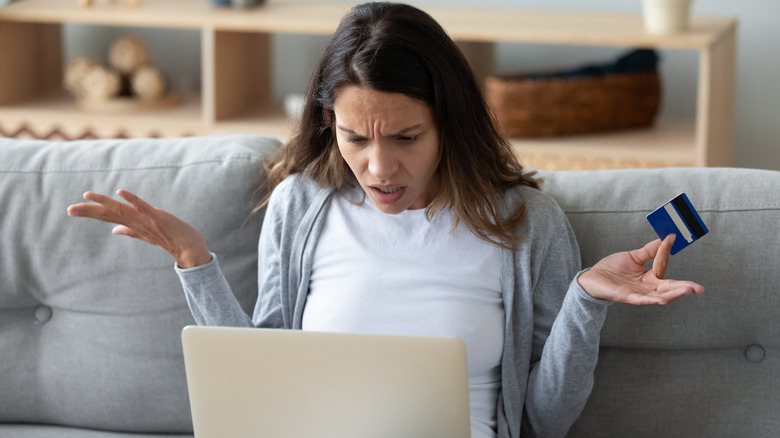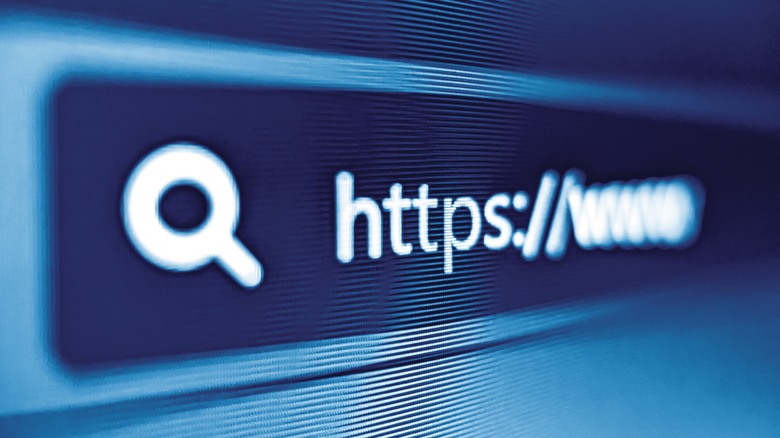The Tell-Tale Sign Your Hotel Booking Site Is Fake
As more and more travelers get back in the groove of things, scammers are looking for additional ways to deceive them. One of the most common scams involves setting up a fake website that resembles a legitimate booking site, fooling many into thinking that they are securing rooms in an actual hotel. These bogus websites typically rip off images, logos, and marketing material from the hotel's official website to appear believable.
The sad news is many fall victim to these scams. A study conducted by the American Hotel & Lodging Association in 2018 found that a whopping $5.7 billion was lost to this fake hotel-booking modus operandi. That's a significant bump from the $3.9 billion wasted on fraudulent bookings in 2017. "In today's increasingly digital marketplace, consumers rely on the comfort and ease of online hotel bookings," Katherine Lugar, president and CEO of the American Hotel & Lodging Association, said in a statement. "Unfortunately, research reveals that as online bookings have surged, so have online booking scams. Too many consumers have been duped by these bait and switch websites."
The last thing you want is to lose your hard-earned money on a hotel room that doesn't even exist. To save yourself from falling for these fake websites, there's one thing you should look for first when booking hotels — the "https" in the URL.
Make sure the URL has https in it
Just because a website looks legitimate doesn't necessarily mean that it's actually secure. Even if it has high-quality images, reviews, and logos, it could still be completely bogus. One way of knowing if a website is fake or not is to check if the URL has "https" at the beginning. According to the Better Business Bureau, checking for "https" (versus only "http") is one helpful indication that a web page is secure. The "s" in "https" refers to Secure Socket Layer (SSL)/Transport Layer Security (TLS) protocol, which ensures that your data is encrypted online.
The Better Business Bureau also suggests looking for a padlock symbol in the address bar, but it should be noted that as of 2023, Google is doing away with that icon and replacing it with what is called the "tune" symbol to avoid confusing users. Apparently, the company believes the lock symbol is misleading users into thinking that a website is automatically "trustworthy." Instead of purely relying on whatever icon is in front of the URL, what you can do to gauge a site's trustworthiness is to click the symbol and verify if the security certificate indeed belongs to the hotel or establishment.
What's more, you may also want to take a closer look at the domain name to see if it's spelled incorrectly or if any of the letters have been jumbled. If you spot a mistake, it's best to steer clear of that site.
You may also consult a fake website checker
After doing your due diligence, if your gut is still telling you that there's something off about a certain website, you may consult website checkers to see if it's legitimate or not. For instance, Google's Safe Browsing site scours billions of websites every day to determine which ones are safe and which to stay away from. It may not be an exhaustive database, but it's a pretty reliable barometer for checking a site's legitimacy.
Alternatively, you can always book directly with the hotel. Not only can it help you snag discounts not published elsewhere, but it can also score the best rooms available. Plus, you'll also be helping out the business rake in more revenue directly, especially if it's a small bed and breakfast or a hotel that's not part of a massive chain.
"Travelers may not know that third-party sites take up to 40% commission," Leanne Turner, chief operating officer of the hotel consulting company Alo Index, told Washington Post. "Big hotel brands have the leverage to negotiate this percentage down, but independent hotels struggle to balance the wide distribution of a third-party booking site with losing nearly half the room revenue to commission."


